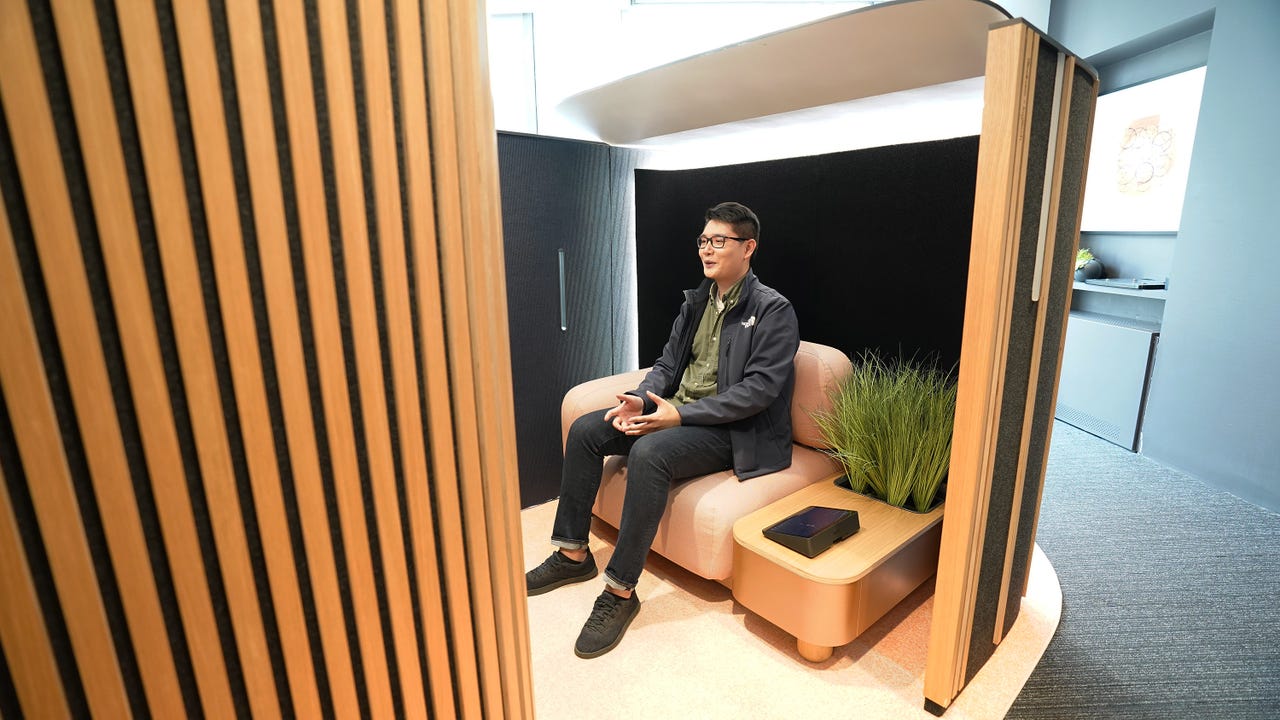
June Wan/ZDNET
I recently got a chance to check out Logitech’s Project Ghost, a video-conferencing booth that the company first unveiled in January and has now accelerated the development of for private demos and user feedback. It’s reminiscent of Google’s Project Starline, another roomy adaptation of the standard laptop-webcam combo for virtual calls.
The goal is mutual: To make video calls more intimate, promoting visual cues like eye contact and body language — two things that are less apparent when your at-home webcam only captures your head and you have oh-so-glanceable tabs opened beside the call window.
Also: 5 products we expect to see at Google I/O (and 3 surprise picks)
But unlike Google’s 3D-mapping laser projector that requires an internet connection faster than light, Project Ghost leverages existing technologies, like Logitech’s own Rally system and Tap hub, and encapsulates them with furniture designed by Steelcase. Together, you get the most “I survived the pandemic” invention yet, and it all somehow works.
June Wan/ZDNET
The concept of video conferencing is nothing new, but things really took off when working from home became the norm. Even today, companies are still trying to figure out the best way to have virtual conversations.
Eye glaze, or lack thereof, is the biggest issue when evaluating traditional methods of video conferencing, Scott Wharton, GM of Logitech’s B2B Group, tells me as I cozy up on a cushioned seat. Surrounding me is a booth — think business class on your favorite airline — with bespoke designs all around, an ample amount of lighting that’s warm enough to feel natural, and even some greenery to my left to set the mood.
Also: Best standing desk chairs and wobble stools
Across from me is what I can only describe as a blacked-out puppet stage. But instead of a puppet appearing before my eyes, it’s another person, dialing in from hundreds of miles away. I stare in silence and curiosity. Do I wave as if we’re talking face-to-face, or should I wait until the timing is just right to “unmute” myself? Naturally, our eyes meet and the conversation flows like any other.
The illusion of talking face-to-face is achieved by an old-school camera trick: Pepper’s Ghost. If you’ve ever used a teleprompter, watched Tupac perform at Coachella, or gone on Disney’s Haunted Mansion ride, then you’ve experienced this phenomenon to some capacity. With a strategic assembly of mirrors, an image, or in this case, the other person in the video call, appears as if it’s three-dimensional.
June Wan/ZDNET
The illusion is not as convincing when you’re facing it at an angle, but it’s good enough to make you feel immersed when the conversation begins. Most importantly, the person on the other side is cast right in front of the Rally webcam so that as you stare at them, you’re also facing directly at the camera.
Also: The best webcams you can buy right now
“We basically did the opposite of what most people did in the industry. It doesn’t have all the fancy technology, but I’d say that’s a good thing,” Wharton tells me. It’s true. Project Ghost is pitched to offices and other shared workspaces as a modular, easy-to-use, video-conferencing booth that can be assembled within two hours. In the future, customers will also be able to pick and choose the materials, pieces of furniture, and sizes to suit their needs.
Here’s a render of what a video-conferencing booth could look like.
Logitech
With Project Ghost, business users are the number one customers. If you’re giving an all-hands meeting, wouldn’t you want to look your employees in the eye to convey the importance and value of your messages? The idea has also been pitched for medical use, simulating the coziness and intimacy of an in-person consultation.
Also: What is Freeform, and why should it be your next creative brainstorming tool?
What Project Ghost isn’t is a direct replacement for the webcam that you’re already using at home. No one is going to swap their $50 webcam (or the one built into their laptop) with a therapeutic video booth. Instead, Logitech sees this idea as being valued by professionals, office managers, and users who want a better, more immersive communication platform — and are willing to pay for it.
There’s no official price for Project Ghost yet, but Wharton tells me the first units will be available in the Fall of this year for under $20,000. That’s a hefty ask for a product category that’s continuously evolving, but Logitech says it’s relative to how much offices typically pay for high-quality furniture and off-the-shelf cameras, and it believes Project Ghost will shape how we work and collaborate in the future.